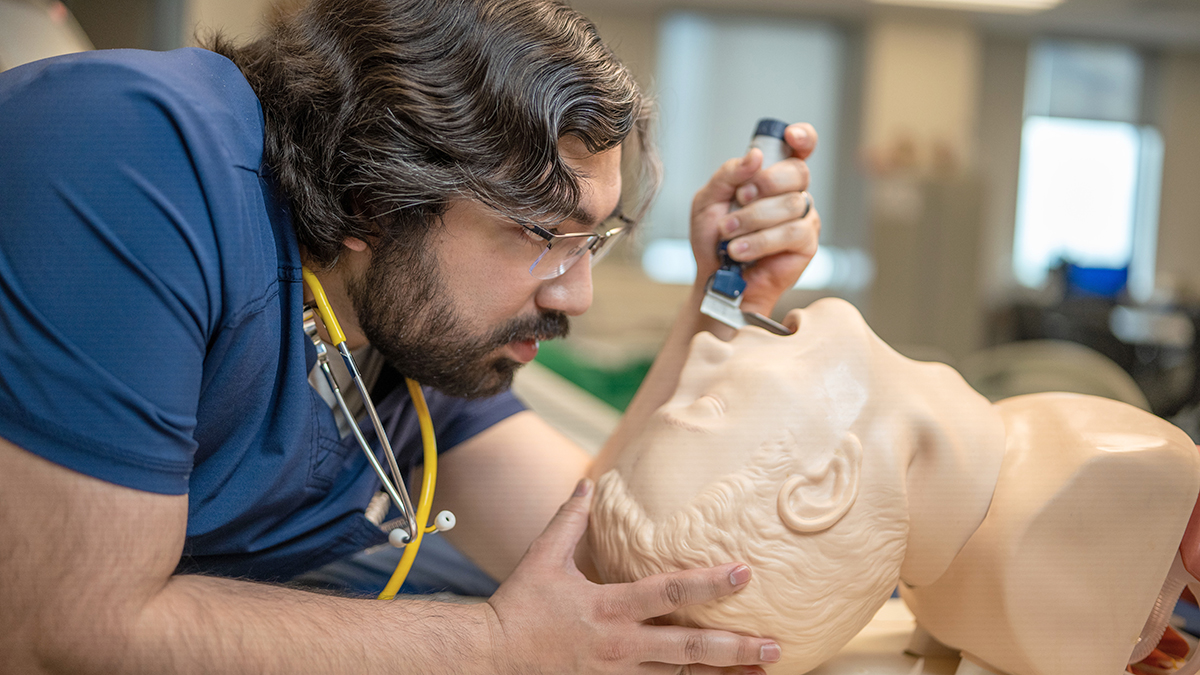Respiratory Therapy

About the Program
The two-year Respiratory Therapist (RSPT) program is designed to prepare individuals for career entry into respiratory care. Respiratory Care Practitioners evaluate, treat, and manage patients of all ages with respiratory illnesses and other cardiopulmonary disorders. Upon completion of the Associate of Applied Science (A.A.S.) degree in respiratory care, the graduate will be eligible to apply for the credentialing exams administered by the National Board for Respiratory Care (NBRC), 10801 Mastin Street, Suite 300, Overland Park, KS 66210. Toll-Free 888.341.4811. The program is fully accredited by the Commission on Accreditation for Respiratory Care (COARC), 264 Precision Blvd Telford, TN 37690 USA, Telephone: 817-283-2835
AWARD TYPES: Associate of Applied Science
AREA OF STUDY: Health Sciences
Degrees and Certificates
Learn more about the Degrees and Certificates offered by this program by visiting the HCC Catalog.

Meet Gia Tran
Student Testimonial
HCC Coleman College continues to transform the lives of countless students every day. Meet Gia Tran, Respiratory Therapy, Class of 2024, and get inspired to start your own rewarding career in healthcare!
Program Learning Outcomes
STUDENTS WILL BE ABLE TO:

Demonstrate Universal Precaution Protocol (Adult Isolation Procedure).

Demonstrate Ethical behavior in the clinical setting.

Demonstrate good communication skills.

Perform Assigned Entry Level Competencies in Clinical, Nasal Cannula.

Perform Assigned Entry Level Competencies in Lab; Adult Hand Washing.
Program Information
A Career in Respiratory Therapy
For thousands of Americans who suffer from breathing problems, each breath is a major accomplishment. These people include patients with chronic lung problems, such as emphysema, asthma, and bronchitis, but they also include heart attack and accident victims; premature infants; and people with cystic fibrosis, lung cancer, or AIDS. In each case, the person will most likely receive treatment from a Respiratory therapist under the direction of a physician. Respiratory therapists work to evaluate, treat and care for patients with breathing disorders.
Diagnostic procedures performed by respiratory therapists include: obtaining and analyzing sputum specimens; obtaining and analyzing blood specimens to determine acid base balance and levels of oxygen and carbon dioxide; measuring the capacity of a patient’s lungs to determine the level of impairment and studying disruptive sleep disorders. Therapeutic procedures performed by respiratory therapists include: administration of supplemental oxygen, initiating and maintaining mechanical ventilation; monitoring and managing therapy that will help a patient recover lung function; administering medications in aerosol form and monitoring patient’s response to therapy; maintaining a patient’s artificial airway; and conducting smoking cessation programs.
The need for respiratory therapists is expected to grow in the coming years due to the large increase in the elderly population; the impact of environmental problems that have already contributed to the yearly rise in number of reported asthma cases; and technological advances in the treatment of heart attack, cancer, and accident victims, as well as premature babies.
While U.S. employment in general is forecast to increase by 15 percent, the need for Respiratory Therapists will grow by up to 26 percent!
With demand for Respiratory Therapists on the rise, salaries are following suit. According to the 2005 Human Resources study from the AARC, the projected average annual earnings of Respiratory Therapists working in the U.S. is $56,222. In this study, therapists just beginning their careers reported average annual earnings of $41,538.
Where do Respiratory Therapists Work?
- In hospitals giving breathing treatments to people with asthma and other respiratory conditions.
- In intensive care units managing ventilators that keep the critically ill alive.
- In emergency rooms delivering life-saving treatments.
- In newborn and pediatric units helping kids with conditions ranging from premature birth to cystic fibrosis.
- In operating rooms working with anesthesiologists to monitor patients’ breathing during surgery.
- In patient’s homes providing regular check-ups and making sure people have what they need to stay out of the hospital.
- In sleep laboratories helping to diagnose disorders like sleep apnea.
- In skilled nursing facilities and pulmonary rehabilitation programs helping older people breathe easier and get more out of life.
Accreditation
The Houston Community College Respiratory Therapy program, CoARC program number 200095, Associate Degree, 1919 Pressler St. / Houston, TX 77030, is accredited by the Commission on Accreditation for Respiratory Care (coarc.com).
CoARC Programmatic Outcomes Data
CoARC accredits respiratory therapy education programs in the United States. To achieve this end, it utilizes an ‘outcomes based’ process. Programmatic outcomes are performance indicators that reflect the extent to which the educational goals of the program are achieved and by which program effectiveness is documented.
View the latest programmatic outcomes data
Licensure/Certification Exam Results
The Respiratory Care Therapy/Therapist program graduates credentials are recognized by the National Board for Respiratory Care (NBRC). Licensure to practice Respiratory Care is issued by the Texas Medical Board (TMB). Licensure to practice is only recognized by the state where it is issued. Moving out of state would require obtaining a license from the new state of residence.
If you have any questions or encounter problems contacting the appropriate licensing board, please contact your Program Director at 713.718.7385
2022-2023 Third-Party Licensure/Certification Exam Results
Occupational licensure and/or certification pass rates reported by academic calendar year (Sept. 1–Aug. 31). Results for the 2020-2021 and 2021-2022 academic years are provided for comparison.
| Program/Aligned Award | Agency Standard | HCC Standard | 2020-2021 Pass Rate (#Passed) | 2021-2022 Pass Rate (#Passed) | 2022-2023 Pass Rate (#Passed) | 2022-2023 Results |
| Respiratory Therapist AAS | 80% | 80% | 100% (16) | 100% (8) | 100% (13) | Above Expectations |
|---|
Texas Education Association (TEA) Industry Based Certification Resource
TEA Industry Based Certification Resource
| Certification Name | TEA Resource Link | Third-Party Certification Agency | Third-Party Certification Agency Website |
|---|---|---|---|
|
Respiratory Care Therapy/Therapist |
https://tea.texas.gov/sites/default/ |
National Board for Respiratory Care | www.NBRC.ORG |
Marketable Skills
Learn more about the marketable skills—skills valued by employers that can be applied in variety of work settings—so you can communicate these to potential employers. Click on the relevant award title below to see descriptions of marketable skills for that area.
Ready to apply? OK let's start!
Applications for this program are accepted during the application window listed in the Admission Guide. Application evaluations will begin once the application window closes.
All admission communications will be sent via email, so please check your personal and HCC email accounts regularly.
1. Complete an information session
Learn more about the Respiratory Therapy Program by completing an online information session.
The online information session is a mandatory requirement of the admission process.
2. Review the admissions guide
Please review the admissions guide for the desired program:
3. Are you a current/former HCC student?
If you are currently/formerly a registered HCC student with a valid student ID number and preferred email address, please proceed to step 4.
If you do not have an HCC student ID number, first apply to HCC at ApplyTexas.org .
4. Apply to the program.
View and fill out the important documents below:
Resources
Search for a Respiratory Therapist Professor or request more information
Respiratory Therapy Program
Dr. Herbert Jackson
Program Director
